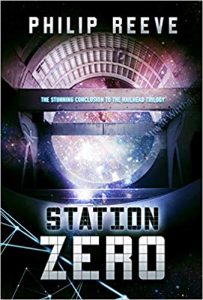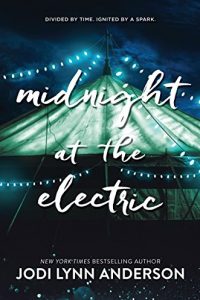Colleen Mondor Reviews Station Zero by Philip Reeve
 Station Zero, Philip Reeve (Oxford University Press 978-0-19-275915-3, 7.99, 288pp, tp) January 2018. (Capstone 978-1684460540, $17.95, 313pp, hc) February 2019.
Station Zero, Philip Reeve (Oxford University Press 978-0-19-275915-3, 7.99, 288pp, tp) January 2018. (Capstone 978-1684460540, $17.95, 313pp, hc) February 2019.
Having now finished reading Station Zero, the final book in Philip Reeve’s fabulous Railhead trilogy, I remain confused about why this science fiction series is not far more popular. It has political intrigue, smart and gutsy teens of all shapes, sizes, races, and genders, more than one battle (with more than one type of alien), a lot of sinister behind-the-scenes attempts at manipulating the characters we care about and – wait for it – SENTIENT TRAINS. Reeve gives readers some classic heroic journeys (one of the protagonists comes from a place that might as well be Tatooine), a romance, a grudging admiration between almost-enemies, a vapid celebrity royal who gets her act together in the biggest way possible, a dinosaur hero (I am not kidding), and some all-knowing “gods” who get their comeuppance. (I am a big fan of the arrogant all-knowing types getting their due.) There is also the whole universe, the gates that get you there and the trains, the trains, the trains.
The inclusion of the sentient trains in these books is just the best thing ever.
That’s what the series has going for it. As to why I love it, that has a lot to do with how all these elements come together in a crackerjack plot that is just as much about growing up as it is about saving a lot of inhabitants on a lot of planets from a megalomaniac who wants everything just to…. well, so he can have everything. (Exhibiting typical megalomaniac behavior is recognizable regardless of the universe you are living in.)
Station Zero picks up about a year after the action in Black Light Express. Zen Starling, the thief who fell in love with a Motorik girl and literally blew up one of the most powerful families in the universe (a lot of whom will not be missed) is now rich and semi-famous and at a complete loss as to what to do with himself. Threnody, the girl who would be queen, is a show piece for yet another group seeking to gain power through manipulation of her much-reduced slice of the empire’s pie, and the new emperor is just… ugh. Battles are still being waged in places that no one pays attention to, aliens are welcome in some places but not others (the eternal plight of the refugee), and the trains are becoming more and more annoyed with the state of affairs with each passing day. Station Zero is thus all about the fallout from the two books that preceded it but also, in the midst of all the action (and there is SO MUCH ACTION), readers will come to recognize just how much Reeve has been ruminating on the nature of power in this trilogy. Zen started out completely powerless, and now, after accomplishing so much, finds himself rich, but, again, completely powerless. The only difference is that now he knows how much he has lost and he is angry, really angry about how things have turned out.
There is thus a perfect recipe cooking in this book for some world-class risk taking and, even better, score settling. (I also want to stress how much better our world would be if dinosaur bodyguards were really a thing.)
Station Zero ties up the loose ends, puts Zen and Threnody and Nova and the Damask Rose in more grave danger, and all of them (with the help of some friends) accomplish great and wonderful and even dazzling things. It’s a good book in a good series, and it is utterly and completely like nothing else on the shelf today. Philip Reeve created a singular literary experience with the Railhead trilogy and managed to pack not only a hefty dose of political and social commentary into his narrative but many moments of absolute glee-filled surprise. Personally, he had me with the trains, but I enjoyed the heck out of every other moment as well.
Colleen Mondor, Contributing Editor, is a writer, historian, and reviewer who co-owns an aircraft leasing company with her husband. She is the author of “The Map of My Dead Pilots: The Dangerous Game of Flying in Alaska” and reviews regularly for the ALA’s Booklist. Currently at work on a book about the 1932 Mt. McKinley Cosmic Ray Expedition, she and her family reside in the Pacific Northwest and Alaska. More info can be found on her website: www.colleenmondor.com.
This review and more like it in the June 2019 issue of Locus.
 While you are here, please take a moment to support Locus with a one-time or recurring donation. We rely on reader donations to keep the magazine and site going, and would like to keep the site paywall free, but WE NEED YOUR FINANCIAL SUPPORT to continue quality coverage of the science fiction and fantasy field.
While you are here, please take a moment to support Locus with a one-time or recurring donation. We rely on reader donations to keep the magazine and site going, and would like to keep the site paywall free, but WE NEED YOUR FINANCIAL SUPPORT to continue quality coverage of the science fiction and fantasy field.






